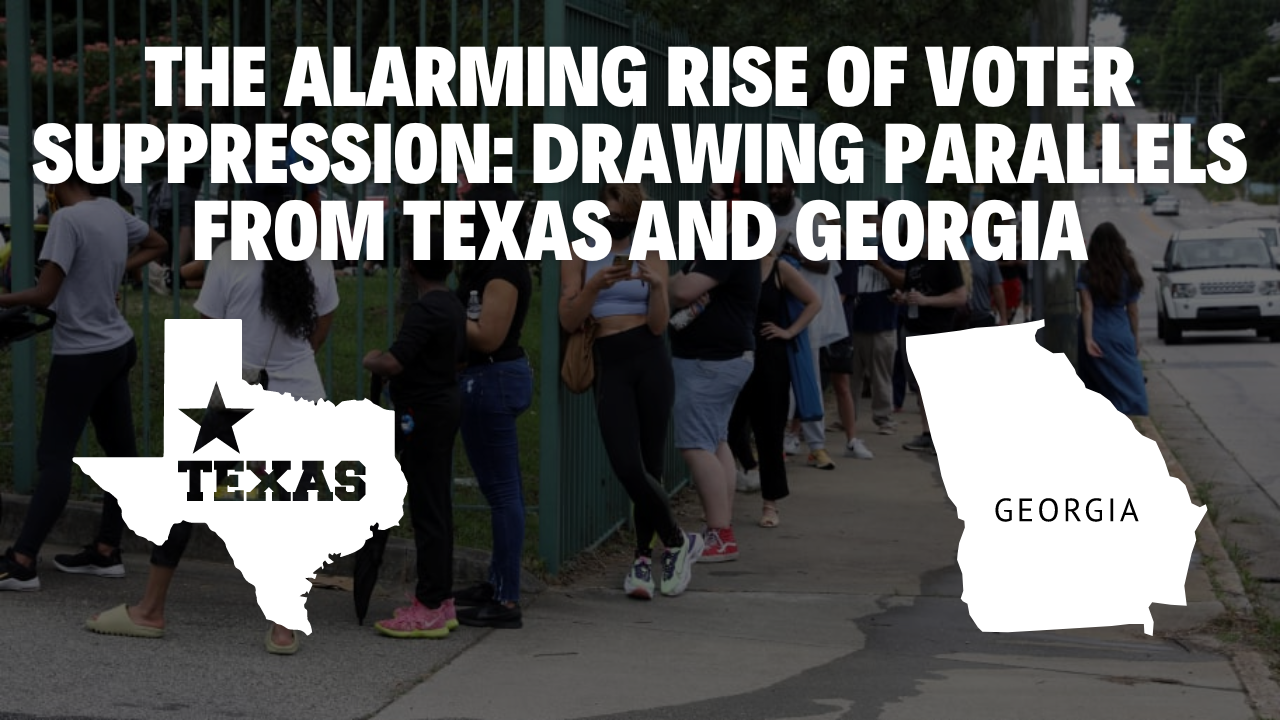The Alarming Rise of Voter Suppression: Drawing Parallels from Texas and Georgia

Introduction
In an era where voter participation should be celebrated and encouraged, recent legislation in states like Texas and Georgia has sparked contentious debates about voter suppression and its ramifications. Such laws, championed as vehicles to maintain election integrity, often contain elements that critics argue systematically undermine the democratic process, particularly for minority groups. Today, we dive deep into these laws and illuminate their nuances.
The Texas Standoff: Democrats Take a Stand
In a dramatic move in 2021, Texas Democrats left their state, bringing the legislative process to a screeching halt. Their aim? To protest and block SB-1, a voting bill with provisions they argued would disproportionately affect minority voters. A few controversial elements of this bill included:
- Stringent ID Requirements for Mail-In Voting: Mandating provision of personal identification details like driver's license numbers or Social Security digits – twice.
- Drive-Thru Voting Ban: Directly affecting Harris County (Houston), which utilized this method during the 2020 pandemic-hit elections.
- Tightening the Early Voting Window: Potentially snuffing out extended hours used prevalently in urban areas.
- Boosting Partisan Poll Watchers: A move feared to escalate voter intimidation.
Georgia: A Familiar Tune
Mirroring Texas, Georgia passed its own contentious bill. Elements of the "Election Integrity Act of 2021", or Senate Bill 202 (SB 202) that drew sharp criticism include:
- ID Protocols for Absentee Voting: Another echo of Texas's proposed legislation.
- Curbing Ballot Drop Boxes: A move seen to hamper the accessibility of voting.
- State Overreach: The state's newfound power to override local election boards.
- Criminalizing Acts of Kindness: Banning distribution of food and water to voters, act critics see as punishing those in long voting queues.
Diving Deep: Texas Senate Bill 1 (SB 1)
While SB 1 encompassed a wide range of election-related topics, certain aspects stood out due to potential constitutional violations and implications for voter suppression:
- Targeting Specific Counties: As the Texas Constitution guards against, SB 1 provisions particularly challenged Harris County's 2020 election methods.
- Potential Voter Intimidation: Boosting partisan poll watchers and introducing strict ID requirements raised significant alarms.
- Centralizing Power: Similar to another bill, SB 1933, SB 1's move to potentially centralize power could compromise electoral integrity.
- Challenging Specific Voter Groups: Echoing SB 1111, provisions that could deter college students or homeless individuals from voting emerged as a significant concern.
Legal Repercussions and Reckoning
In a pivotal moment for voting rights, courts scrutinized these legislative actions. Significant portions of the laws, especially in Texas, faced legal challenges. Most notably, the courts struck down the provision requiring citizens to undergo additional hurdles when applying for absentee ballots. The rationale? States cannot arbitrarily impose immaterial roadblocks to the fundamental act of voting.
Connecting the Dots: Texas and Georgia
The legal scrutiny SB 1 faced in Texas may serve as a blueprint for Georgia. Court rationales and decisions in Texas could be critical references for those in Georgia challenging their local laws. Given that the controversies in both states mirror each other in various capacities, Texas might provide the roadmap for legal strategies in Georgia.
Conclusion
The essence of democracy lies in the voice of its people. As laws that potentially suppress this voice emerge, it becomes crucial to analyze, discuss, and take necessary actions critically. The parallels between Texas and Georgia underscore a broader national narrative, necessitating an urgent, collective introspection.